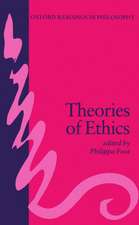Moral Contract Theory and Social Cognition: An Empirical Perspective: Theory and Decision Library A:, cartea 48
Autor Peter Timmermanen Limba Engleză Hardback – 26 mar 2014
Acting in accordance with principles that we could all agree to under certain conditions requires that agents are capable of taking up the perspectives of others. Research in social and developmental psychology shows just how challenging this can be. The author discusses in detail what implications findings on perspective-taking have for contract theory. He concludes with cautious optimism that, despite our limitations, it lies within our power to become better at perspective-taking and to adopt a contractarian or contractualist mode of moral thinking. This does however require us to be much more attentive to the standpoints of others than we tend to be.
Contract theorists also assume that agents can be moved to comply with principles that would be the object of agreement, with some arguing they can be so moved out of their own interest. The book show that, in contrast to the suspicion of many philosophers, this idea is largely supported by research on the dynamics of trust and our ability to distinguish trustworthy from untrustworthy others. Bringing a welcome dose of realism to the debate on contract theory, the author shows the value of assessing moral theories from an empirical perspective.
| Toate formatele și edițiile | Preț | Express |
|---|---|---|
| Paperback (1) | 385.08 lei 6-8 săpt. | |
| Springer International Publishing – 3 sep 2016 | 385.08 lei 6-8 săpt. | |
| Hardback (1) | 392.37 lei 6-8 săpt. | |
| Springer International Publishing – 26 mar 2014 | 392.37 lei 6-8 săpt. |
Din seria Theory and Decision Library A:
- 18%
 Preț: 952.40 lei
Preț: 952.40 lei -
 Preț: 382.57 lei
Preț: 382.57 lei - 18%
 Preț: 958.25 lei
Preț: 958.25 lei - 18%
 Preț: 949.23 lei
Preț: 949.23 lei - 18%
 Preț: 1232.09 lei
Preț: 1232.09 lei - 15%
 Preț: 643.34 lei
Preț: 643.34 lei - 18%
 Preț: 948.92 lei
Preț: 948.92 lei - 15%
 Preț: 581.79 lei
Preț: 581.79 lei - 15%
 Preț: 644.49 lei
Preț: 644.49 lei - 15%
 Preț: 642.83 lei
Preț: 642.83 lei -
 Preț: 389.70 lei
Preț: 389.70 lei - 18%
 Preț: 947.67 lei
Preț: 947.67 lei - 15%
 Preț: 641.20 lei
Preț: 641.20 lei -
 Preț: 388.90 lei
Preț: 388.90 lei - 15%
 Preț: 640.37 lei
Preț: 640.37 lei - 18%
 Preț: 952.26 lei
Preț: 952.26 lei - 15%
 Preț: 641.20 lei
Preț: 641.20 lei - 18%
 Preț: 953.35 lei
Preț: 953.35 lei - 18%
 Preț: 952.89 lei
Preț: 952.89 lei - 18%
 Preț: 951.47 lei
Preț: 951.47 lei - 15%
 Preț: 636.94 lei
Preț: 636.94 lei - 18%
 Preț: 944.82 lei
Preț: 944.82 lei - 15%
 Preț: 643.84 lei
Preț: 643.84 lei - 18%
 Preț: 1383.81 lei
Preț: 1383.81 lei - 18%
 Preț: 1331.51 lei
Preț: 1331.51 lei - 20%
 Preț: 641.99 lei
Preț: 641.99 lei - 15%
 Preț: 647.40 lei
Preț: 647.40 lei
Preț: 392.37 lei
Nou
Puncte Express: 589
Preț estimativ în valută:
75.08€ • 78.24$ • 62.17£
75.08€ • 78.24$ • 62.17£
Carte tipărită la comandă
Livrare economică 03-17 aprilie
Preluare comenzi: 021 569.72.76
Specificații
ISBN-13: 9783319042619
ISBN-10: 3319042610
Pagini: 244
Ilustrații: X, 233 p. 7 illus.
Dimensiuni: 155 x 235 x 20 mm
Greutate: 0.52 kg
Ediția:2014
Editura: Springer International Publishing
Colecția Springer
Seria Theory and Decision Library A:
Locul publicării:Cham, Switzerland
ISBN-10: 3319042610
Pagini: 244
Ilustrații: X, 233 p. 7 illus.
Dimensiuni: 155 x 235 x 20 mm
Greutate: 0.52 kg
Ediția:2014
Editura: Springer International Publishing
Colecția Springer
Seria Theory and Decision Library A:
Locul publicării:Cham, Switzerland
Public țintă
ResearchCuprins
Acknowledgements.- I Introduction.- 1 The Practicability Assumption.- 2 Contract Theory and Perspective-Taking.- 3 Perspective-Taking in Moral Judgment.- 4 Perspective-Taking Accuracy and the Contract Test.- 5 How to Use a Contract Test.- II The Translucency Assumption.- 6 Contract Theory and Translucency.- 7 Translucency and the Irrationality of Straightforward Maximization.- 8 Why Not Be an Opportunist?.- 9 When Constrained Maximization is Rational.- 10 Conclusions.- Appendix.- Index.
Textul de pe ultima copertă
This interdisciplinary work draws on research from psychology and behavioral economics to evaluate the plausibility of moral contract theory. In a compelling manner with implications for moral theory more broadly, the author’s novel approach resolves a number of key contingencies in contractarianism and contractualism.
Acting in accordance with principles that we could all agree to under certain conditions requires that agents are capable of taking up the perspectives of others. Research in social and developmental psychology shows just how challenging this can be. The author discusses in detail what implications findings on perspective-taking have for contract theory. He concludes with cautious optimism that, despite our limitations, it lies within our power to become better at perspective-taking and to adopt a contractarian or contractualist mode of moral thinking. This does however require us to be much more attentive to the standpoints of others than we tend to be.
Contract theorists also assume that agents can be moved to comply with principles that would be the object of agreement, with some arguing they can be so moved out of their own interest. The book show that, in contrast to the suspicion of many philosophers, this idea is largely supported by research on the dynamics of trust and our ability to distinguish trustworthy from untrustworthy others. Bringing a welcome dose of realism to the debate on contract theory, the author shows the value of assessing moral theories from an empirical perspective.
Acting in accordance with principles that we could all agree to under certain conditions requires that agents are capable of taking up the perspectives of others. Research in social and developmental psychology shows just how challenging this can be. The author discusses in detail what implications findings on perspective-taking have for contract theory. He concludes with cautious optimism that, despite our limitations, it lies within our power to become better at perspective-taking and to adopt a contractarian or contractualist mode of moral thinking. This does however require us to be much more attentive to the standpoints of others than we tend to be.
Contract theorists also assume that agents can be moved to comply with principles that would be the object of agreement, with some arguing they can be so moved out of their own interest. The book show that, in contrast to the suspicion of many philosophers, this idea is largely supported by research on the dynamics of trust and our ability to distinguish trustworthy from untrustworthy others. Bringing a welcome dose of realism to the debate on contract theory, the author shows the value of assessing moral theories from an empirical perspective.
Caracteristici
First study to evaluate the empirical plausibility of moral contract theory Reveals that certain crucial assumptions of moral contract theory that have been controversial are in fact plausible in the light of empirical findings First comprehensive study to scrutinize the implications of recent empirical findings on social cognition for moral theory Highly interdisciplinary study, relating insights from philosophy with results from social psychology, development psychology, and behavioural economics Includes supplementary material: sn.pub/extras

















